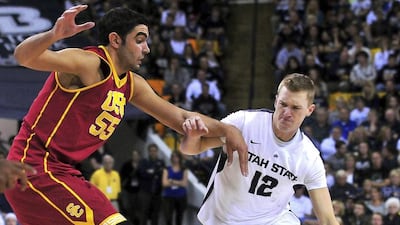If Omar Oraby is going to travel the road from Egypt to the National Basketball Association, he is going to have to build it himself. It is not a well-worn path.
The Cairo native is a 7ft 2 ins, 270lbs (122kg) senior centre at the University of Southern California (USC). He is hoping to find a spot with a professional team next summer.
The only Egyptian-born player to have logged time in the NBA is Alaa Abdelnaby. But he had the advantage of growing up in the United States, before playing at Duke University and in the NBA from 1990-95.
“I’ve heard of him, but it was after I came [to the US],” said Oraby, 22. “I didn’t know who he was when I was in Egypt.”
That is not a surprise. Basketball is not a major sport there. Even from the region, only a limited number of players have emerged to play in the NBA. Currently there are two Israelis (Omri Casspi and Gal Mekel) and four Turks (Omer Asik, Ersan Ilyasova, Enes Kanter and Hedo Turkoglu) active in the league. Another 10 or so NBA players come from Balkan countries.
The Iranian Hamed Haddadi played five years with the Memphis Grizzlies and Phoenix Suns, but is now on a team in China.
None of that concerns Oraby. Someone has to be a pioneer.
“People don’t look at Egypt, but there is talent over there,” he said. “Me coming here can open doors for other players.”
As a child, Oraby was tall for his age, drawn to outdoor activities, but charmed mostly by basketball.
“I liked all sports – volleyball, soccer, tennis, swimming – but basketball stood out for me,” he said. “I loved it. I liked to watch NBA games on TV, even with the time difference. I wanted to pursue it, but I had no idea how it worked.”
As it turned out, organised basketball pursued him. At 17, he was the leading rebounder and shot blocker, and a key scorer, for the Egyptian junior national team at the 2009 Under 19 World Championships in New Zealand. College recruiters were watching, and Oraby was offered a scholarship to Rice University in Texas.
“I had opportunities to play [professionally] in Egypt and Europe,” he said. “The level of play in the US – I thought that was the best for me since my dream was to play in the NBA. I could get a great education, too.”
Living away from home and adjusting to the quicker, more athletic play of American basketball was challenging enough. But Oraby also has had his stressful moments wondering about the political turmoil in Egypt while he has been away.
In early 2011, when demonstrations and violence first erupted in Cairo, he lost touch with his parents and older brother and sister who live there.
“Everything went off for about a week – internet, the phone,” he said. “I didn’t know how my family was. There was news that people were getting killed.”
Fortunately, his family was safe and remains safe today, he said. He has been back to Egypt each summer since. He tells his American friends that Egypt “isn’t as dangerous as people think, unless you get involved in the protests.” Oraby does not advocate for any particular faction in his country, if and when fellow students inquire.
“I don’t understand politics,” he said.
He played two years at Rice before transferring to USC, citing better competition. Early in his final collegiate season, he is averaging 9.8 points, and 6.9 rebounds per game. It is his shot-blocking ability that stands out now, at 2.9 per game. But shot blocking alone will not be enough if he wants to make it at the elite level.
His coach at USC, Andy Enfield, said that NBA scouts are keeping tabs on Oraby’s progress. Although his name is not listed on any 2014 mock draft boards, internet evaluators of college talent believe Oraby’s height will get him into an NBA camp as a free agent.
“Omar certainly has the size and the touch,” said Enfield of his NBA prospects. “The question is how productive will he be for the rest of this season, and how much will he improve. He still has a lot to prove.”
Oraby believes he has to be more physical, to use his imposing body to his advantage.
“In the NBA,” he said. “I’ll be going against bigger and stronger guys.”
Said Enfield, “He has such good footwork and touch around the basket, but occasionally he lets a defender off the hook by not being as aggressive as he should.
“He doesn’t know that he can be the most dominant man out there. He’s such a hard worker, he can get there.
“We’re still teaching him that he’s leaving points and rebounds on the floor.”
Depending on his NBA dream, Oraby also would like to join the Egyptian national team for the World Cup in Spain next September.
Regardless of his basketball future, he may already have had some influence. Three more players from Egypt have followed Oraby to play Division 1 college basketball in the US – Abdul Ahmed of Cal State Bakersfield, Ahmed Hamby of Houston and Mostafa Abdel Latif of Sacred Heart.
“It’s not impossible,” said Oraby. “It can be done if you know there’s an opportunity.”
They know a little more now.
sports@thenational.ae

